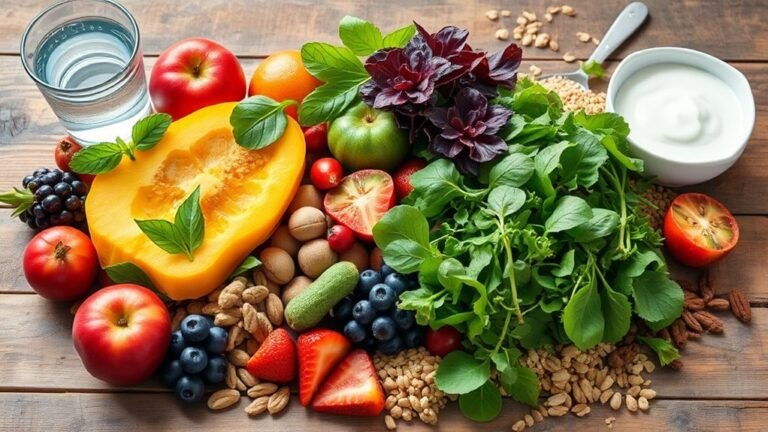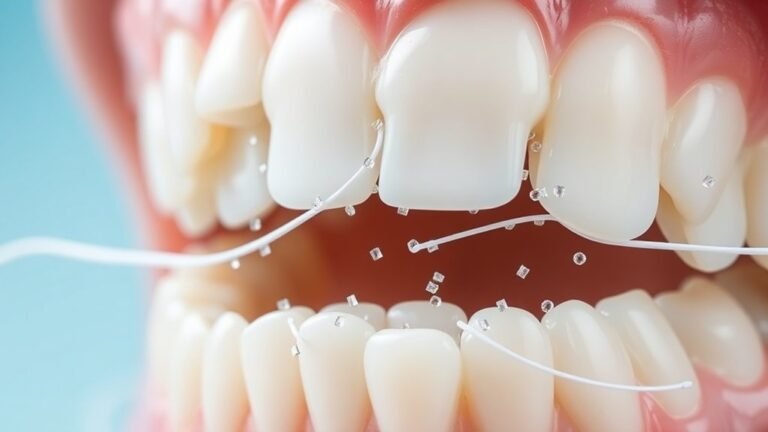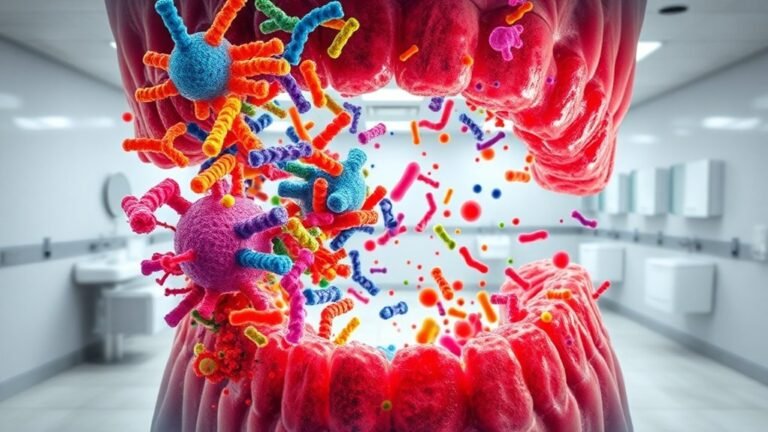Can Dietary Changes Stop Cavities From Acid-Producing Oral Bacteria
Dietary changes can definitely help stop cavities caused by acid-producing bacteria. By reducing your sugar intake, you limit the food source for harmful bacteria like Streptococcus mutans, decreasing plaque buildup and enamel erosion. Incorporating cavity-fighting foods—like dairy, crunchy fruits, and vegetables—adds essential nutrients that strengthen enamel and promote a balanced oral microbiome. Staying hydrated and opting for water over sugary drinks makes a big difference too. There’s more to explore about how food choices affect your oral health.
Key Takeaways
- Reducing sugar intake limits food supply for acid-producing bacteria, decreasing cavity risk.
- Incorporating fluoride-rich foods strengthens enamel, making teeth more resistant to decay.
- Eating crunchy fruits and vegetables helps scrub teeth and control plaque buildup.
- Probiotics from yogurt and fermented foods can balance oral bacteria and inhibit harmful species.
- Staying hydrated with water instead of sugary drinks promotes gum health and reduces cavity formation.
Understanding Cavities and Their Causes
When you bite into a sugary treat, it’s easy to overlook the potential damage it can cause to your teeth. The primary culprit behind tooth decay is a bacterium called Streptococcus mutans. This acid-producing bacteria thrive on sugars, leading to the formation of acids that erode your enamel. This process contributes to dental caries, commonly known as cavities. Your oral microbiome plays an important role in this dynamic; an imbalance can increase harmful bacteria while decreasing protective ones. Dietary changes, such as reducing sugar intake and increasing fiber-rich foods, can help support a healthier oral environment. By making conscious food choices, you can greatly lower the risk of tooth decay and maintain better dental health.
The Role of Oral Bacteria in Tooth Decay
While it might seem surprising, the bacteria in your mouth play an essential role in the development of tooth decay. These oral bacteria, particularly cariogenic bacteria, thrive on sugars and produce acids as a byproduct. These acids lead to acid attacks on your tooth enamel, creating the perfect environment for cavities to form. When you neglect oral hygiene, dental plaque builds up, providing a habitat for these harmful bacteria. Effective brushing and flossing can help disrupt this plaque, reducing the risk of tooth decay. By maintaining good oral hygiene practices, you can limit the harmful effects of oral bacteria and protect your teeth from cavities. Remember, your daily habits directly influence the balance of bacteria in your mouth.
How Diet Influences Oral Health
Diet plays a crucial role in shaping your oral health, as the foods you choose directly impact the balance of bacteria in your mouth. High sugar intake can lead to an increase in bacterial plaque, creating an environment where cavities thrive. Reducing sugary foods and beverages is essential for cavity prevention. Instead, focus on a balanced diet rich in fruits, vegetables, and whole grains, which can support your oral care routine. These foods not only nourish your body but also help maintain a healthy balance of oral bacteria. Remember, your diet’s impact on oral health goes beyond just teeth; it affects your overall well-being. By making mindful dietary choices, you can contribute markedly to your dental health.
Foods That Fight Cavities
Incorporating certain foods into your meals can considerably bolster your fight against cavities. Foods rich in fluoride, like fish and tea, help strengthen enamel and reduce erosion. Crunchy fruits and vegetables, such as apples and carrots, naturally scrub your teeth, aiding in plaque control and promoting oral balance. Additionally, dairy products like cheese and yogurt contain calcium and probiotics, which can combat harmful mouth bacteria. Natural remedies, like green tea, have antioxidants that can inhibit cavity-causing pathogens. Incorporating these foods not only nourishes your body but also creates an environment less favorable for bacteria, ultimately supporting your dental health. By making these choices, you can take significant steps toward preventing cavities and maintaining a healthy smile.
Practical Dietary Changes for Stronger Teeth
To strengthen your teeth and prevent cavities, making practical dietary changes can have a significant impact on your oral health. Incorporate calcium-rich foods like dairy, leafy greens, and almonds to support enamel strength. Adding probiotics, found in yogurt and fermented foods, helps balance oral bacteria and can reduce harmful biofilm formation. Stay hydrated and opt for water over sugary drinks to maintain gum health and rinse away food particles. Regular dental cleaning is essential, but your diet also plays a role in preventing bacterial infections that lead to cavities. By making these simple adjustments, you can create an environment in your mouth that promotes stronger teeth and overall oral wellness.
Frequently Asked Questions
Can Certain Supplements Help Prevent Cavities Caused by Oral Bacteria?
Certain supplements, like fluoride and calcium, can help strengthen enamel and reduce cavity risk. Probiotics may also balance oral bacteria. It’s best to consult your dentist for personalized recommendations and a thorough oral health plan.
How Long Does It Take for Dietary Changes to Affect Cavity Formation?
It typically takes about three to six months for dietary changes to influence cavity formation. By consistently including tooth-friendly foods and reducing sugars, you can considerably improve your oral health over time.
Are There Specific Foods That Worsen Oral Bacteria Growth?
Yes, sugary foods, refined carbohydrates, and acidic beverages can worsen oral bacteria growth. They feed harmful bacteria, leading to acid production and potentially increasing your risk of cavities. Prioritize whole foods to promote better oral health.
Is It Necessary to Completely Eliminate Sugar for Better Oral Health?
Think of sugar as fuel for harmful bacteria. While you don’t need to eliminate it completely, reducing your sugar intake considerably can improve your oral health and decrease the risk of cavities caused by these bacteria.
Can Hydration Levels Impact Oral Bacteria and Cavity Formation?
Yes, staying hydrated helps maintain saliva production, which neutralizes acids and washes away food particles. Proper hydration can reduce harmful bacteria, ultimately lowering your risk of cavities and promoting better overall oral health.
Conclusion
To summarize, while dietary changes alone might not completely eliminate cavities, they can considerably reduce the risk by creating an environment less favorable for acid-producing bacteria. Integrating tooth-friendly foods like dairy, leafy greens, and nuts into your meals can enhance your oral health. By being mindful of what you eat and making small, consistent changes, you can effectively support your teeth and combat decay. So, why not give your smile the boost it deserves?






